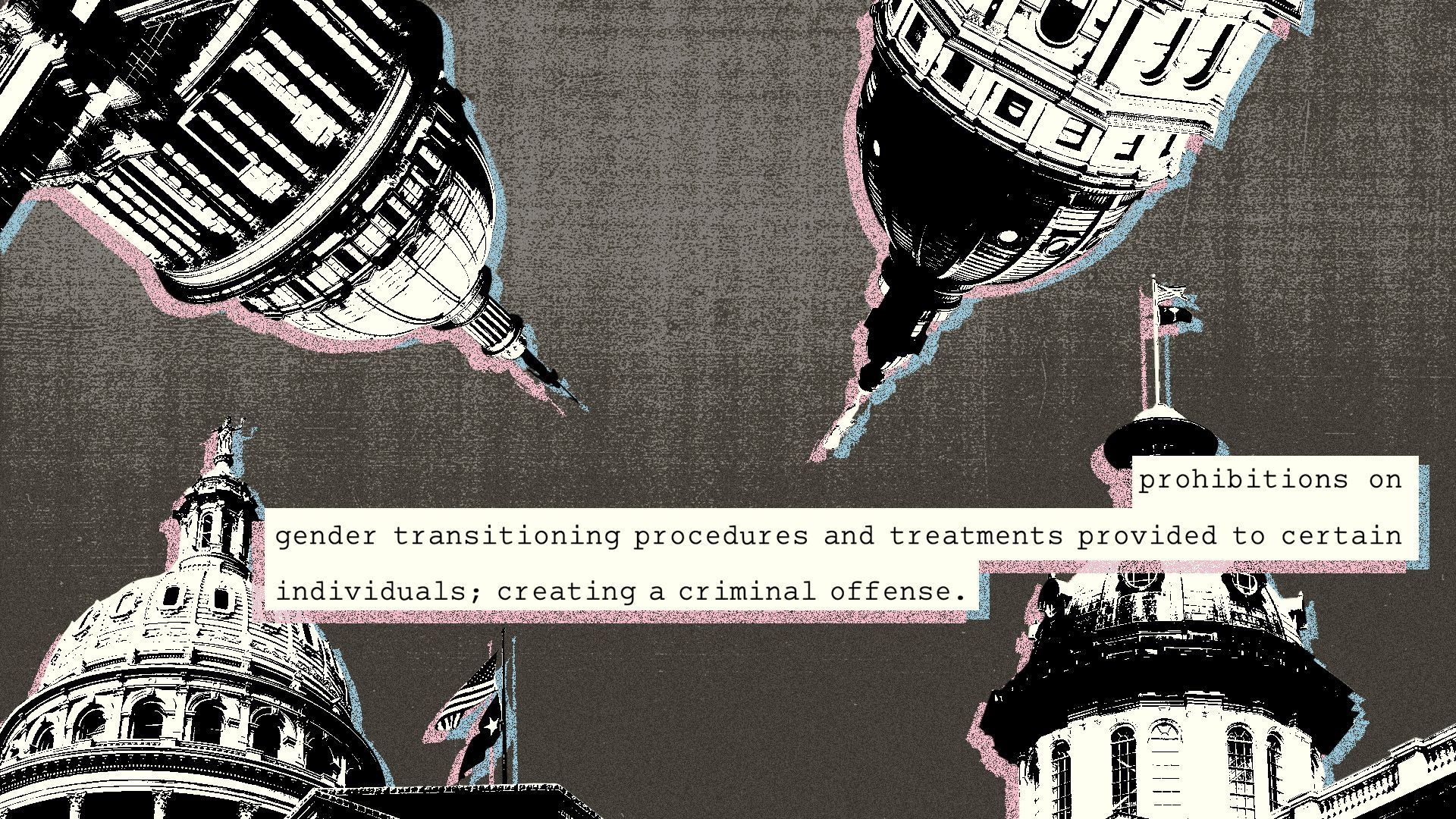GOP lawmakers expand gender-affirming care restrictions to adults

Illustration: Aïda Amer/Axios
State efforts to restrict gender-affirming care are moving beyond trans youth and increasingly focused on patients over the age of 18.
The big picture: Legislators in Kansas, Oklahoma, South Carolina and Texas have introduced bills barring health providers from offering care such as hormone treatments or surgery to people as old as 26.
- In contrast to past messaging around protecting children, some proponents of the latest proposals portray gender-affirming care as a business that is exploiting people in need of psychological care.
- "We think that [gender-affirming care] is bad medicine and that it's consumer fraud," said Terry Schilling, president of the conservative group American Principles Project, which works with lawmakers to introduce anti-trans measures. "We don't believe that men can change into women based off of removing body parts or changing our hormone makeup."
- Matt Sharp, senior counsel for the conservative advocacy group Alliance Defending Freedom, said that while his organization is focused on bills restricting care for minors, gender-affirming care for adults is not something "we ought to be encouraging or supporting," instead patients should be getting mental health treatments like "psychotherapy."
Gender-affirming care advocates say the efforts are proof anti-trans lawmakers want to block all access to those services, not just restrict care to minors.
- "This was always a long-term plan of trying to eliminate all access to care, all visibility and safety for trans people of all ages," said Milo Inglehart, staff attorney at the Transgender Law Center.
Driving the news: This month, Texas state Rep. Tony Tinderholt introduced H.B. 4574, which states that a health professional who provides gender-affirming care to a trans person under 26 — or even refers a patient to another provider — could be sentenced to jail and lose their medical license.
- A similar bill was introduced in Oklahoma in January, but the bill's author ended up lowering the age limit to 18 following intense backlash from LGBTQ rights advocates.
- The bills in Kansas, Oklahoma and South Carolina look to ban health care for trans people under 21.
- These measures come on top of others in several states that would allow adults to file malpractice suits against providers who performed gender-affirming care.
Don't forget: Gender-affirming care is endorsed by medical groups, including the American Medical Association, the American Academy of Pediatrics, the Endocrine Society and the World Health Organization.
Zoom in: The lawmakers who have introduced bills with 26 as an age limit have said that it's because the brain isn't fully developed until the age of 25 — an assertion health experts say is misleading.
- While most individuals' brains continue to develop until around the age of 25, the idea of having to wait until then to make a health care-related decision "seems pretty absurd," said Michael Hendricks, a clinical psychologist in Washington, D.C., who specializes in transgender issues.
- "This is a really good indication of an instance of misuse of science," he said, noting providers already evaluate candidates for gender-affirming procedures "to make sure that they're exercising sound judgement" before going through with any gender-affirming treatment.
State of play: Some state bills that ban health care for trans youth also have clauses that prohibit public funds from being used in gender-affirming care and bar private health insurers from covering treatments — a move that legal experts say essentially are de facto bans for adults as well.
- Adding these "restrictions into what purports to be bans on gender-affirming care only for minors will not function that way. It's for many folks, … we see that as an attempt to ban care for really everyone," said Harper Seldin, a staff attorney for the American Civil Liberties Union's LGBTQ and HIV Project.
- Bills that block the use of public funds are susceptible to a broad reading, meaning that a "hospital or entity that received state funds for any reasons perhaps could not provide [gender-affirming care] even if the care itself is only paid for with private funding," Seldin added.
Between the lines: Oklahoma and Florida are quickly advancing bills to ban health care for minors that also prohibit health care coverage of gender-transition treatments for any person regardless of age. Arkansas has a law in its books that does the same, but it is currently blocked.
- Florida's bill adds restrictions for adults seeking gender-affirming care, such as requiring a patient to submit a written consent form to their provider each time they meet for an appointment.
- Bills that create insurance coverage regulations and add restrictions are "more likely" to become enacted than outright adult bans, said Cathryn Oakley, state legislative director and senior counsel at the Human Rights Campaign.
- However, Oakley added that anti-trans bills have been getting increasingly more restrictive over the years, and bans with increased age limits are a "continuation" of that trend.
What we're watching: Republican politicians have become more outspoken in their opposition to gender-affirming care, with messaging that could intensify as the 2024 elections draw closer.
- American Principles Project's Schilling said that the "consensus" right now is around preventing kids from transitioning and barring insurance coverage for gender-affirming treatments.
Go deeper:
- What states are restricting transgender health care
- Axios Explains: Gender-affirming care in the U.S.
Source: Read Full Article
